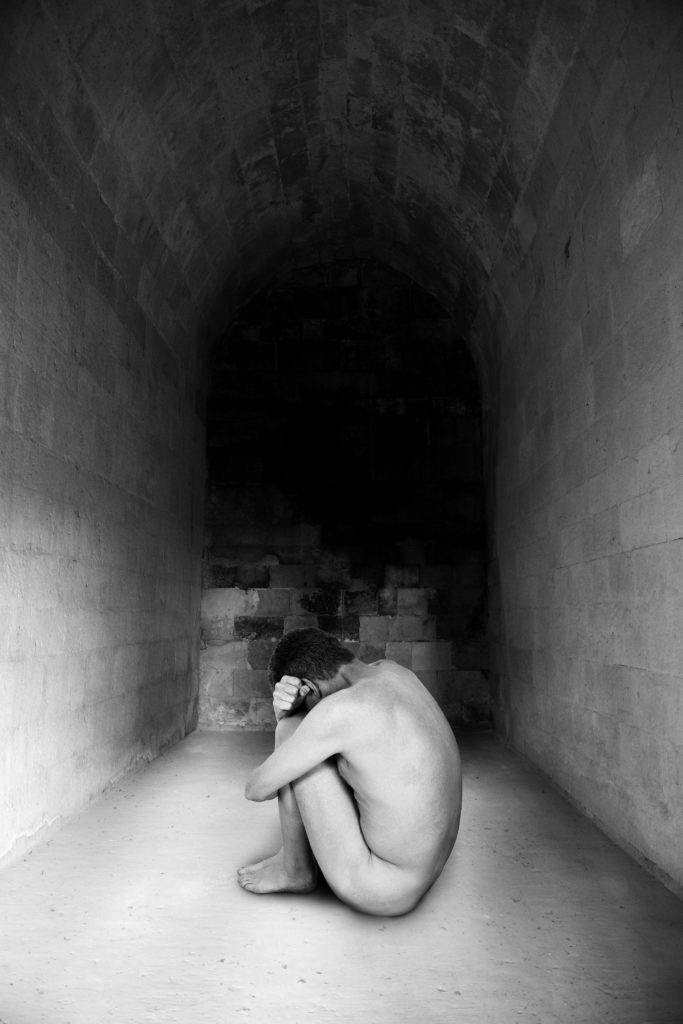Healing Anxiety in an
Anxious World
BY SHERYL PAUL
Anatural and predictable pattern occurs when someone starts to heal from intense anxiety. As soon as the ceaseless mind chatter quiets down, a space opens up inside that feels like emptiness. Anxiety, like all emotions, is energy, which takes up space in our minds and bodies. When we attend to the anxiety and it begins to fall away, the space that it previously occupied opens up. What’s often left is emptiness, and if you don’t fill it with the next obsessive thought or action, you will notice one or both of the following:
1) you’ll open a space for clarity and spiritual direction to enter and
2) the underlying feelings that you’ve been covering up your entire life will emerge
Unfortunately, because our culture encourages us to remain busy and fill up empty time and space, when people encounter emptiness they try to figure out what’s wrong, and fill it back up with the endless chatter of thoughts. Instead of pouring thoughts back into the empty space, I encourage my clients to sit quietly and resist the cultural belief that there’s something wrong with it.
In the three-stage process of transitions—separation, liminal, rebirth—emptiness is the defining quality of the liminal zone. This means that if you’re in a transition—and we’re all in the transition of life, bookended by birth and death—some transitions stand out in greater relief during this life journey. So when you’ve worked through the first stage of grieving and letting go of the old life, familiar structures and current identity, what often follows is emptiness. This often happens for people who find my work. After they’ve worked through the initial layers of anxiety and learn that they’re not alone, the space opens up for wisdom and pain to enter. And those two experiences—wisdom and pain—are cousins in the inner world of the psyche.
The truth is, it’s only when we work through the layers of anxiety that create static and arrive at emptiness that we can begin to find clarity. As Rabbi Tirzah Firestone writes in With Roots in Heaven:
Sometimes the more powerful response is disengagement, to simply stop trying to appease this dark angel, to stop wrestling—reacting, proving, defending our worth—and sit still. By not reacting to our inner beasts, neither fighting nor trying to disprove them, we create an empty space in ourselves. Just as water requires an empty container in which to be collected, so the Self requires an empty space in us into which to pour its guidance.

In this sense, emptiness is normal and healthy. It’s only when we allow it—sit with it as we would a good friend—that something new can arise: a creative thought, an idea, an insight, or a sense that everything is okay.
Alongside clarity and spiritual direction, you may also find that grief, old and new, arises from the womb of emptiness; a lifetime of crying pushed down deep inside or an awareness of the sadness that accompanies a truly open heart. It’s important to distinguish between the natural emptiness that follows working through a layer of anxiety—like surrendering to a good cry—and the emptiness that results from closing your heart to pain.
Many people have a deep fear of feeling their pain. They’re afraid that if they really cry, they’ll go crazy, lose control, fall apart, appear weak, or die. These fears began in childhood, when perhaps there was no one there to support them through their pain. As a young child, the overwhelming feeling of pain is too big for a young body to handle alone. Coupled with the prevailing cultural message of “get over it,” when a child is left alone to feel this pain, they quickly learn to shut down. The walls jut up around the heart and remain there until as an adult, the child is terrified of anyone coming too close.
It’s at this time, when anxiety quiets down and gives way to emptiness, that the deeper pain is invited to emerge. Then you have two choices: to remain stuck in the pain and continue to resist it, or to make the choice to open your heart and feel the lifetime of pain that has been living there. As Michael Singer writes in The Untethered Soul:
If you close around the pain and stop it from passing through, it will stay in you. If you relax when the pain comes up inside your heart, and actually dare to face it, it will pass. Every single time you relax and release, a piece of the pain leaves forever. Every time you resist and close, you are building up the pain inside. It’s like damming up a stream. You are then forced to use the psyche to create a layer of distance between you who experiences the pain and the pain itself. That is what all the noise is inside your mind: an attempt to avoid the stored pain.
So here you are on this threshold, a precipice, where the anxiety has quieted and you’re left with the emptiness. If you stop moving and stop searching and find stillness, you’ll touch what wants to be known. You’ll grieve, yes. You’ll cry out in old pain. You’ll find yourself raw and vulnerable. You’ll open to inner wisdom. You’ll find clarity. You’ll feel joy. It begins with the willingness to keep your heart open and experience whatever has been living beneath the anxiety.
Sheryl Paul, MA, has counseled thousands of people worldwide through her private practice, her bestselling books, her e-courses, and her website ConsciousTransitions.com.